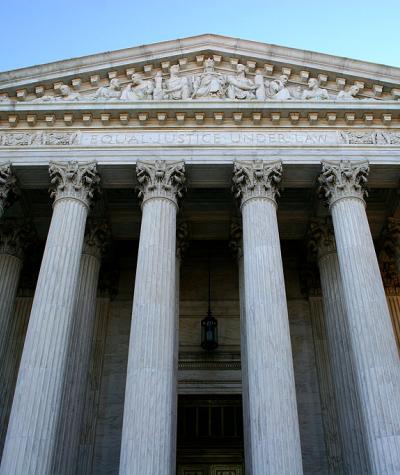Several readers have asked for additional explanation of the practical effects of applying “strict scrutiny” to judicial review of contribution limitations, first discussed in yesterday’s blog “The Grenade in the McCutcheon briefs.”
When the Court decides to apply strict scrutiny, it requires a law to be “narrowly tailored” to advance a “compelling governmental interest,” and to be the” least restrictive” means to achieve the governmental interest. This is in practice designed to be a high bar that few laws can meet—leading to the law school proverb that this type of judicial review is “strict in theory, and fatal in fact.” The Court applies strict scrutiny to those areas where it believes almost no government regulation is justified—such as laws constituting prior restraint on newspapers or that limit independent political speech. By contrast, “intermediate” scrutiny, which currently applies to court review of contribution limits, requires only that a law be “closely tailored” to further an “important governmental interest." Also known as “closely drawn” scrutiny in the field of campaign finance, it is a more relaxed form of judicial review that the Court applies when it recognizes that governmental regulation in a particular area may often be constitutionally permissible, and that that deference to Congress may be appropriate.
By arguing for strict scrutiny, McCutcheon and McConnell are asking the Court to heighten the standard of review not only for aggregate limits, but for all contribution limits—which means that such limitations would be much easier to defeat in future court cases. In effect, heightening the standard of review would change the likely outcome of court challenges to contribution limits in future cases.
Yesterday’s post with this addendum follows below.
THE GRENADE IN THE MCCUTCHEON BRIEFS
Those who have been following the Supreme Court case, McCutcheon v. FEC, know that it is a challenge to the $123,200 federal limit on how much an individual can give, in aggregate, to candidates, political parties and PACs in a single election cycle. What they may not realize, however, is that the plaintiffs and some of the amici curiae who filed in their support—in particular Senator Mitch McConnell (R-KY), who has requested and received time to participate in the oral argument next week—have also made an even more extreme request of the Supreme Court: namely, that the Court overturn the key legal principle that the “standard of review” (what the government has to show to justify regulation) is different for limits on campaign contributions than limits on campaign expenditures.
While this request sounds legalistic in nature, if the plaintiffs and Senator McConnell are successful in convincing five Justices of this argument, then not only will the Court strike down the current aggregate contribution limits, but in the future it will be much easier for those seeking to remove all contribution limits and allow unlimited contributions to candidates and parties to challenge any contribution limit in court.
When the Court decides to apply strict scrutiny, it requires a law to be “narrowly tailored” to advance a “compelling governmental interest,” and to be the” least restrictive” means to achieve the governmental interest. This is in practice designed to be a high bar that few laws can meet—leading to the law school proverb that this type of judicial review is “strict in theory, and fatal in fact.” The Court applies strict scrutiny to those areas where it believes almost no government regulation is justified—such as laws constituting prior restraint on newspapers or that limit independent political speech. By contrast, “intermediate” scrutiny, which currently applies to court review of contribution limits, requires only that a law be “closely tailored” to further an “important governmental interest." Also known as “closely drawn” scrutiny in the field of campaign finance, it is a more relaxed form of judicial review that the Court applies when it recognizes that governmental regulation in a particular area may often be constitutionally permissible, and that that deference to Congress may be appropriate.
Since its 1976 decision in Buckley v. Valeo, the Supreme Court has found that restrictions on campaign expenditures represent a greater burden on First Amendment rights than do restrictions on campaign contributions. The theory is that a limit on a person’s campaign expenditures directly restricts that person’s own political speech, whereas a contribution limit merely limits the degree to which that individual can symbolically show support for another person’s speech. For these reasons, the Supreme Court has consistently applied strict scrutiny to expenditure restrictions and "closely drawn" scrutiny to contribution restrictions; in practice, this dual standard of review has meant that the Court has struck down expenditure limits while almost always upholding contribution limits.
Filing in support of the McCutcheon plaintiffs, Senator McConnell now asks the Court to “revisit the bifurcated standard of review for political contribution and expenditure limits and hold that strict scrutiny applies to both.” By arguing for strict scrutiny, McCutcheon and McConnell are asking the Court to heighten the standard of review not only for aggregate limits, but for all contribution limits—which means that such limitations would be much easier to defeat in future court cases. In effect, heightening the standard of review would change the likely outcome of court challenges to contribution limits in future cases.
If the Supreme Court were to agree with this radical request, overturning almost forty years of precedent, McCutcheon could end up being more dangerous to American democracy than the recent Citizens United decision. A broad ruling adopting the “strict scrutiny” standard would not itself invalidate the base limits, but by changing the applicable standard of review, the decision would encourage legal challenges to all limits in the future, and make them much harder to defend. TheMcCutcheon case—and Senator McConnell’s amicus brief—thus may appear to target a single discrete law, but actually threatens to overturn a core principle of American campaign finance law since Buckley v. Valeo in 1976.
